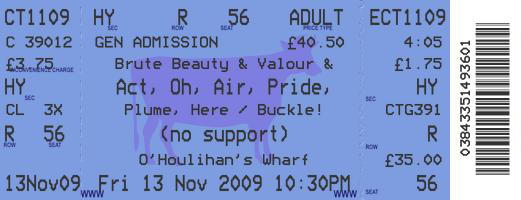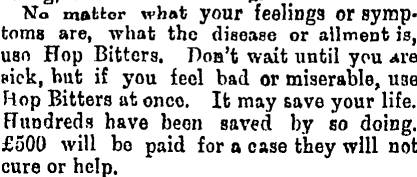The town of Throm is perhaps best known for its gorgeous sewers, with their chandeliers, Rococo ironwork railings, and jewel-encrusted access ladders. In spite of the magnificence of their sewers, the Thrompersons fought hard to win that official designation as a town. It is, after all, the size of a village, with the atmosphere of a hamlet, and the public morals of a cluster of shabby huts. But town it now is, at least on paper, and bursting with civic pride. The mayor’s chain of office hangs around his neck, and trails along the ground into the gutter, where it drops through a brightly polished grating down, down, deep down into the most subterranean of the sewers, where it is bolted to an adamantine slab of rock, and bolted fast. It is a long chain, a chain the mayor is proud to wear. At the end of his term, the soldering person will come and unfasten it from around his neck, and it is at this time, his ten-years’ duty done, unloosed from his chain, that the ex-mayor might make a trip to Bosis.
Some have mistakenly dubbed Bosis the twin-town of Throm. It is no such thing. It is neither town nor village nor hamlet, nor even a cluster of huts. It certainly has no sewers to rival Throm. It has no sewers at all, for it is the kind of place that, though rained upon incessantly, has always been shunned by drainage engineers. So to the untrained eye Bosis can look like a mere midden of mud and filth and muck, roosted upon by the occasional disoriented scavenger gull or vulture. This unseemly prospect conceals, however, the great attraction of Bosis, which draws Thrompersons to it week in, week out, through the winter months. Bosis is registered as a site of historical significance, for it was here, at the dawn of time, that the Lord appeared, carrying an enormous burlap sack. There are many versions of the story, but the essential details are covered by Abbie Farwell Brown in The Curious Book Of Birds (1903):
One day the Lord gathered together all the insects in the world, all the beetles, bugs, bees, mosquitoes, ants, locusts, grasshoppers, and other creatures who fly or hop or crawl, and shut them up in a huge sack well tied at the end. What a queer, squirming, muffled-buzzing bundle it made, to be sure! Then the Lord called the woman to him and said, “Woman, I would have you take this sack and throw it into the sea!”
This Lord has been erroneously identified as the God of the Christians, but recent scholarship carried out at the Bosis Institute Of Insect History has put a pretty firm kibosh on that idea. It now seems certain that the Lord referred to was actually a native of Throm, or what passed for Throm in those distant days, and may have been the same Lord who dug the very first shaft of what was to become the fantastic sewage system. We know much more about the woman who was entrusted with the sack. She was a Bosisite, of the higher peasantry, in raiment of turquoise, with bells on her fingers and bells on her toes, a maiden of baffles and puffers and woad. Her name, we think, was Clothgard.
Thus is the close link between Throm and Bosis explained, although one puzzling aspect of the tale is that both town and midden are far inland, far, far from the sea. It is possible that the Lord’s brain was ravaged by the fumes released when he sunk a shaft into the mud at Throm, and he knew not what he did. We have clues that he performed some other curious deeds, in Throm and Bosis and further afield. Incidentally, given the foul and barely habitable nature of present-day Bosis, the Institute Of Insect History hovers above it, in an airship tethered to a sturdy wooden post.
Should you wish to make the trip from Throm to Bosis, bear in mind that the recommended route is one of much squelching, and watertight boots are advisable. One ex-mayor of Throm did the journey in his socks, for a wager, and they found him in a ditch in the squelchy wasteland between town and midden, shivering and gibbering and beset by flies and gnats and bugs and beetles and other escapees from the Lord’s enormous squirming sack.




 François Rabelais
François Rabelais Sir Thomas Browne
Sir Thomas Browne